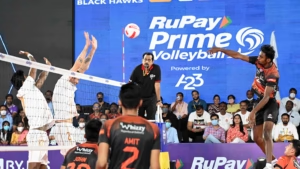India’s teenage badminton sensation Unnati Hooda delivered a stirring campaign at the Yonex Taipei Open Super 300, held from May 6–11, 2025, making her way to the semi-finals before bowing out to Japan’s World No. 8 Tomoka Miyazaki.
The 17-year-old from Rohtak has steadily grown in stature on the international circuit, and her latest showing has now catapulted her eight spots up the BWF Women’s Singles rankings to a new career-best World No. 45.

Despite a 19-21, 11-21 defeat in the semis, Unnati’s fearless performance through the draw speaks volumes of her potential and the depth India continues to build in women’s singles badminton.
The Semifinal Clash: A Lesson in Margins
Facing Tomoka Miyazaki—known for her fast-paced rallies and impeccable control—Unnati started strong, matching the Japanese star point-for-point in the opening game.
Her sharp court coverage and smashes into the corners kept her in contention, but a few unforced errors in the final stretch saw her lose the first game narrowly, 19-21.
The second game, however, tilted clearly in Miyazaki’s favour. The Japanese shuttler stepped up her pace and forced Unnati into deeper defensive positions, breaking her rhythm. The Indian struggled to find her attacking range and lost the second game 11-21.
Still, to take on a top-10 player and stretch her in patches is a marker of Unnati’s growing maturity and readiness for higher-tier tournaments.
Unnati’s Route to the Semis: Calm, Composed, Clinical
Unnati’s journey to the semifinals was a masterclass in consistency and mental resilience.
- Round of 32: She opened her campaign with a solid win over fellow Indian Anupama Upadhyaya, beating her 21-13, 21-17 in a tactical contest where she maintained control from the net and varied her pace effectively.
- Round of 16: Against Taiwan’s Lin Sih Yun, Unnati was in a league of her own. Her 21-12, 21-7 victory in just under 30 minutes reflected her superior shot selection and early dominance.
- Quarterfinals: Facing home favourite Yi Ting Hung, Unnati showed composure in a tough three-game match. She took the opener comfortably 21-8, slipped in the second 19-21, but rallied to close it out 21-19 in the decider—showcasing her fitness and temperament under pressure.
Each of her wins highlighted different facets of her game: calmness in all-Indian matchups, aggression against defensive players, and composure in the face of a home crowd.
A Breakthrough Week, A Break into the Top 50
Unnati’s progress in Taipei didn’t just earn her a spot in the semifinals—it earned her valuable BWF points that lifted her into the top 50 of the world rankings for the first time.
She moved up eight places to sit at World No. 45, making her one of the youngest players in the elite bracket.
This comes on the back of a steady 2025 season where she’s been gradually improving results and gaining confidence through consistent match play.
With key events like the Indonesia Open and Canada Open on the horizon, Unnati’s trajectory is now closely watched by Indian fans and global observers alike.
Youth on the Rise: What This Means for Indian Badminton
India’s women’s singles circuit has long been buoyed by stars like PV Sindhu and Saina Nehwal, but with Unnati Hooda pushing into the world’s top 50 and names like Ashmita Chaliha, Anupama Upadhyaya, and Malvika Bansod also competing well, a new generation is clearly on the rise.
Unnati’s results are particularly noteworthy because of her age and the maturity she displays. She’s part of a growing group of Indian youngsters who are not just participating in senior BWF events but making meaningful runs deep into the draws.
The Badminton Association of India (BAI) has taken note of her performances, and Unnati’s inclusion in major camps and training squads in the lead-up to events like the 2026 Asian Games or even Los Angeles 2028 Olympics now looks increasingly probable.
What’s Next for Unnati?
With her current form and momentum, Unnati is likely to be entered into more BWF World Tour Super 300 and 500 events. Her biggest challenge now will be maintaining consistency against higher-ranked players and adding sharper tactical variation to her game—especially in second games, where top-tier players often outmaneuver rising stars.
Yet, if Taipei is anything to go by, Unnati Hooda is no longer a prospect—she’s a threat.
How useful was this post?
Click on a star to rate it!
Average rating 5 / 5. Vote count: 2
No votes so far! Be the first to rate this post.






